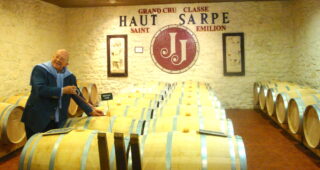Passion knows no barriers of language or nationality, and this was at its demonstrable best as Dr. Giuseppe Martelli, the President of Italy’s National Wine Committee, struck an instant rapport with vinos in New Delhi even as he spoke in Italian with an interpreter at hand. Dr. Martelli was speaking at “The Sweet Taste”, a workshop showcasing Italian food and wine conducted under the aegis of the Italian Trade Agency (ITA) at The Leela Palace, New Delhi.
About Dr. Giuseppe Martelli
An oenologist and biologist, Dr. Martelli, taught at the Viticulture and Oenology Institute in Conegliano (Treviso). He worked at the Italian Ministry of Agriculture’s Experimental Viticulture and Oenology Institute and at the “Tenute Sella & Mosca” farmstead in Alghero.
Since 2009, he has been the President of the National Wine Committee (under the Italian Republic’s Ministry of Agriculture), which is the major consultation and proposal body in the wine sector. He is also the Honorary President of the Union Internationale des Oenologues, a Paris-based Federation that represents the National Viticulture Technicians Associations worldwide, where he earlier served as full time president from 2003-08. In an earlier role, Dr. Martelli was the Managing Director of the Italian Oenologists Association (Assoenologi), the National Trade Organisation of Viticulture Technicians from 1978-2016.
My interaction with Dr. Martelli was facilitated by Ms. Mahima Yadav, Assistant to the Director of the Italian Trade Agency in New Delhi, who very kindly offered to be the interpreter despite her hair-splitting schedule.
Dr. Martelli’s thoughts
Me: What are the major functions of National Wine Committee (NWC) of Italy?
Dr. Giuseppe Martelli (GM): The National Wine Committee is the most important advisory body of the Ministry of Agriculture of the Republic of Italy in the wine sector. It comprises of 28 people representing the main categories of the wine sector, appointed by the Minister of Agriculture. It was established in 1964 and since then, its key objectives remain unchanged. Its purpose is to give opinion, in accordance with current legislation, on questions related to wines in general and on wines with denomination of controlled and guaranteed origin (DOC and DOCG, or DOP in the European Union) and in specific geographical location (IGP in the European Union). The views of the NWC are published in the Official Gazette of the Republic of Italy.
Me: According to an IWSR study, Italy doubled its wine exports to India in the period 2008-12 and is currently the second largest exporter to India. France remains the top exporter in terms of value despite not being among the top here exporters to India. Do you think Italy will address this?
GM: France has been investing in the presentation and communication of its wines in India for a very long time, while Italy has joined in only recently as India is a market of rising importance. Hence, it’s logical that French wines are better known in India. But, I believe that the alert and experienced Indian consumer is getting increasingly closer to the Italian producers, and in the coming years, will certainly prefer our bottles, being fascinated not only by the quality of the content, but also by the history and the culture that characterizes every production of ours.
Me: India is among the “significant markets of long term”. What initiatives are planned to promote Italian wines in India?
GM: The Italian Trade Agency (ITA) in New Delhi under their new Director, Dr. Francesco Pensabene, is proposing an initiative to promote Italian products in India with great professionalism. I believe that the exchange of opinions, insights and advice initiated by the ITA have been working well in this respect. “The Sweet Taste” initiative, for which we are here, is concrete evidence of this headway.


Me: The last edition of Vinitaly in India was in 2010. What might be the reason for this? Can we hope to see another edition of Vinitaly in India in the near future?
GM: The Verona fair, Vinitaly, cannot be present everywhere, and has limited its conduct to three markets: USA, Russia and Hong Kong. Personally, I believe that since the consumption of wine is not that high in India, producers prefer to go directly to the importers, buyers, opinion leaders and journalists, rather than approaching the consumer directly. Therefore, I believe that the role of the Italian Trade Agency and the Embassy of Italy in India becomes even more important to promote Italian wines.
Me: The Free Trade Agreement (FTA) between India and the European Union is still under discussion. Are you hopeful of its successful conclusion?
GM: This question is complex and demands the attention of the relevant agencies and government bodies. I really hope that it will soon come to a definition where it takes into account the requirements of both India and Europe, in the interests of the wine trade. There is no denying the fact that taxes on imported wine in India are amongst the highest in the world – and this often discourages those who believe strongly in Indian markets and are willing and determined to invest.
Me: In your opinion, what are the factors that may work in favour of Italian wines in India?
GM: By increasing the knowledge of our wines, first at the level of opinion leaders and trade and then at the consumer level, a perception of “value for money” can be instilled. I know that the Indian consumer, as generations before him, is pre-disposed to aperitifs with a super high alcoholic base. I hope that the new generations appreciate Italian white wines as aperitifs, not only for their alcoholic strength but also for the delicacy and fragrance that the wines express and allow you to drink more – hence allowing a longer socialization. Having said that, I feel that Italian wines are more suitable to the high temperatures of the climate in your country, as well.
However, given the delicacy, the tastes, the strength and the variety of your Indian kitchen, I am sure that a better understanding of the potential success of classic Italian red wines – robust and appropriately aged – will happen in India. And of course, all the above is subject to the level of duties and import taxes that your country upholds!

(This interview was first published in vino india)









